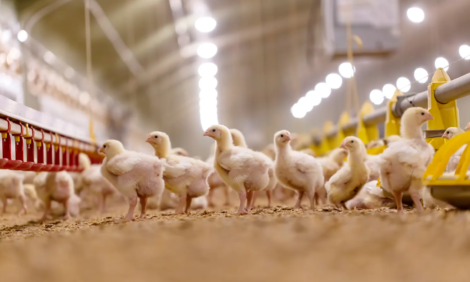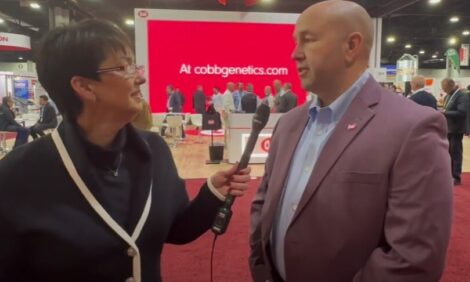



Dutch Solution for More Welfare-friendly Egg Production
A near-crisis in the egg industry in the Netherlands a decade ago sparked a whole new way of looking at egg production to address better the three Ps – people, planet and profit – with hen welfare at its heart. Jackie Linden visited the Brandsen family farm recently to see the Rondel system.Peter Koelewijn, General Manager Roundel®, is passionate about the egg industry, and especially about restoring the position of the sector in society, which requires increased transparency and a sustainable production system.
He says this needs three things: firstly, a basis that is ethically grounded, based on needs of the food chain and animals, using fairness as a means of long-term sustainability; second, scientifically verifiable results that are repeatable and thirdly, it must be economically viable in terms of return on investment and its contribution to society.
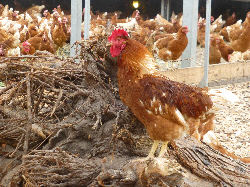
Re-thinking Egg Production
From the air, the Rondel looks like a large round cake from which one piece has been removed. At its heart is a large two-storey loft which serves as the central services area for the climate control equipment, with space for the egg-collecting system, as well as storage space for the eggs, feed and other essentials.
Radiating out from the central hub are six segments, five of which comprise a linked pen area and foraging area, each housing 3,000 hens. Each segment is used by one group of hens and is covered by a roof.
Peter explained that the pen area offers the birds opportunities for feeding drinking, laying and resting. It is separated from the foraging area by a curtain that can be raised and lowered. The foraging area is covered by a roof and wire outer walls, offering the benefits of Nature inside, without the disadvantages.
The separate day and night-time areas allow the birds to perform all their natural behaviour in a safe and secure place, he explained.
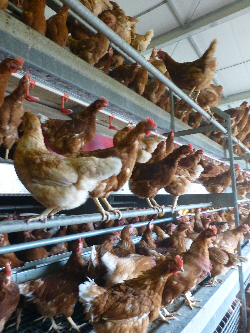
A visitors’ tunnel at bird level shows the facilities to encourage bird activity such as scratching on the special chicken turf material and dustbathing. On the outer edge of each foraging area segment are old trees to encourage further natural behaviour.
The design allows for optimum natural ventilation, with automatic controls linked to a weather station on the roof, which takes account of the wind direction and there are heat exchangers that warm up the incoming air.
The Rondel Concept
The history of the Rondel goes back about 10 years, Peter explained, when an outbreak of avian flu in the Dutch poultry industry threatened its future.
In a re-think of the whole sector, the Ministry encouraged the development of shorter supply chains with the involvement of stakeholders including consumers, animal welfare experts, retailers, scientists and vets with the view to improving the system regarding the three Ps – people, planet and profit.
This was managed by Wageningen University Research, which in 2004 carried out a study entitled Houden van Hennen (“Keeping Hens”) that examined the options for a sustainable future for Dutch poultry farmers.
It came up with two systems – the Rondel and the Plantation. The latter included an outdoor area; it has also been further developed since.
The Rondel meets all the original demands of the stakeholder group, which included better bird welfare, a lower environmental impact, the need to fit in with the landscape, greater transparency for the public and an economically sustainable enterprise for the farmer.
Key to the success of this project, according to Peter, was the high level of cooperation between all the Dutch partners – the University, supply chain and the farmers’ organisation as well as consumers.
The first Rondel was opened in Barneveld in 2010 and there are now three full-sized systems and one mini-version in Amsterdam, taking the idea to city consumers.
Vencomatic Group established a new sister company, Rondeel B.V., to demonstrate its confidence in the innovation and the will and the ability to lead the way in new developments in laying hen husbandry, helping to preserve the Netherlands’ leading position in the poultry sector.
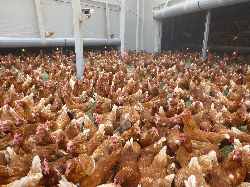
Hen Welfare at the Core
As Peter explained, European consumers do not see any difference between the banned battery cages and the permitted colony cages for hens in terms of bird welfare. He believes these are not a solution in Europe in the long term.
Floor/aviary systems are better alternatives for the hens as they offer the opportunity to express their natural behaviour of perching at higher levels in a less enclosed space. Eggs from these systems carry the EU code number “2” for barn eggs.
The Rondel takes hen housing to a new level with its daytime area, protected from the bad weather by a roof but with natural light and ventilation and large area for the birds to express their natural behaviour for scratching, dustbathing and perching.
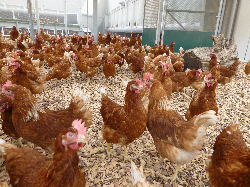
One of the core principles of the system is the health of the birds, and the low dust levels benefit hens and workers alike.
Important for success is the right feeding management during rearing and for the first 20 weeks of life, Peter stressed, as problems early on are hard to rectify later.
With the Rondel, hens are not beak-trimmed and for the four flocks that have been through the system, feather pecking and cannibalism have not been a problem. Careful management and monitoring mean that before these aggressive behaviours cause problems, any victims are removed and distractions are provided for the rest of the flock.
Not only is the welfare on this farm good, it can be seen to be good by the many visitors, who can come to the farm to see the birds from the visitor area and buy eggs.
Offering the birds the facilities to express all their natural behaviours in a protected environment makes the Rondel one of the best commercial systems available for hen welfare.
Sustainable Supply Chain
Returning to the core principles of a short supply chain, good animal welfare, a building that blends into the landscape and offers farmers pride in their work and a more satisfied society, the Rondel ticks all the right boxes.
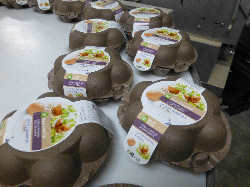
Marketing eggs
For the Rondel system to be a sustainable business, it was important to get the marketing of the eggs right, Peter explained.
For a start, the eggs are sold in packs of seven – one per day for a week - in eco-friendly cartons – made from potato fibre. Further pack sizes of three and 10 eggs have now been added to the range.
A close relationship with the retailer, Albert Heijn, was established to build up this new market segment.
The egg price they receive is linked to the feed price, with a premium that makes them equivalent to organic eggs. The system has achieved a three-star rating with Beter Leven (“better living”), the highest rating from the Dutch animal welfare organisation and normally only granted to organic eggs.
The cost per hen place is two to three times higher than conventional egg systems, according to Peter.
Valuing spent hens
The value of the hens at the end of their laying life – 76 to 78 weeks of age - is also an important part of the economic sustainability of the system, Peter stressed.
There is a strong focus on the meat quality of the hens to increase returns as well as benefiting animal welfare. The birds are mostly frozen and exported to South Africa, where the tastier meat is especially appreciated.
There is also a contract with the Dutch national airline, KLM, for the meat as sandwich fillings, sharing the system’s benefits along the supply chain.
“You don’t need much to give a good taste,” Peter said. The birds receive a standard complete feed without GM feed ingredients.
Manure as fertiliser
The environmental sustainability of the Rondel has not been neglected.
The manure is dried by a third party to makes pellets of 80 to 85 per cent dry matter as a fertiliser.
There are already three full-sized Rondel systems and a mini-version, currently located in Amsterdam to raise the interest in urban consumers.
Looking ahead, Peter said that the aim is for six full systems in order to maintain a constant supply of Rondel eggs.
And the Rondel has received positive reactions from other countries – from Freedom Foods in the UK and the Good Egg Award from Compassion in World Farming.
September 2014







